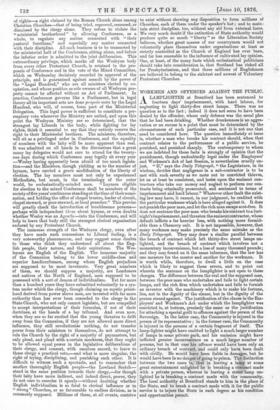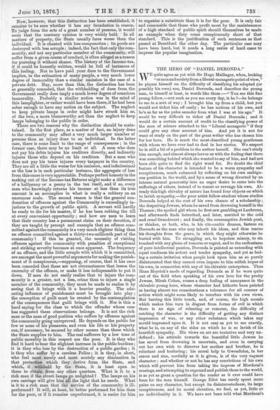WORKMEN AND OFFENCES AGAINST THE PUBLIC.
ALAMPLIGHTER at Brentford has been sentenced to fourteen days' imprisonment, with hard labour, for neglecting to light thirty-five street lamps. There was no question as to the fact ; indeed it does not seem to have been denied by the offender, whose only defence was the usual plea that he had been drinking. Whether drunkenness is an aggra- vation or an excuse is a point that must be determined by the circumstances of each particular case, and it is not one that need be considered here. The question immediately at issue is, whether a man who breaks his contract should, when that contract relates to the performance of a public service, be punished, and punished sharply. The contemporary to whom we are indebted for these facts is strongly of opinion that the punishment, though undoubtedly legal under the Employers' and Workmen's Act of last Session, is nevertheless cruelly un- just. "If," says the Daily Telegraph, "the Legislature, in its wisdom, decides that negligence in a sub-contractor is to be met with such severity as we mete out to convicted thieves, let us at least be consistent, and insist upon the eminent con- tractors who take our money and neglect to perform our con- tracts being criminally prosecuted, and sentenced to terms of imprisonment and hard labour." Whatever other fault the exist- ing law may have, it cannot, in our judgment, be credited with the particular weakness which is here alleged against it. It does not punish the poor man, and let the rich man escape scot-free. It does not sentence the poor man who breaks his contract to a fort- night's imprisonment, and threaten the eminent contractor, whose default inflicts a far heavier loss, with nothing more iormid- able than a Chancery suit. It is not impossible, however, that many workmen may make precisely the same mistake as the Daily Telegraph. They may draw a similar parallel between the breach of contract which left thirty-five street lamps un- lighted, and the breach of contract which involves not a momentary inconvenience, but a loss of many thousand pounds; and they may found on it the same inference, that the law has one measure for the master and another for the workman. It is worth while, therefore, to dwell a little on the case which is likely to suggest these errors, and to point out wherein the sentence on the lamplighter is not open to these charges. The difference between the real and the supposed case, between the poor man who undertakes and fails to light certain lamps, and the rich firm which undertakes and fails to furnish an inventor with the machinery which is to make his fortune, lies, not in the dignity of the sinner, but in the dignity of the person sinned against. The justification of the clause in the Em- ployers' and Workmen's Act under which the lamplighter was convicted is, at bottom, precisely the same as the justification for attaching a special guilt to offences against the person of the Sovereign. In the latter case, the Community is injured in the person of its representative ; in the former case, the Community is injured in the persons of a certain fragment of itself. The lamp-lighter might have omitted to light a much larger number of lamps in some private park, and his omission might have inflicted greater inconvenience on a much larger number of persons, but in that case his offence would have been only an ordinary breach of contract, and could only have been dealt with civilly. He would have been liable in darawes, but he would have been in no danger of going to prison. The distinction between the two cases is, that in leaving a laiitp at some great entertainment unlighted he is breaking a contxact made with a private person, whereas in leaving a street lamp un- lighted he is breaking a contract made with the community. The local authority at Brentford stands to him in the place of the State, and to break a contract made with it for the public service is to injure the State in such degree as his condition and opportunities permit.
Now, however, that this distinction has been established, it remains to be seen whether it has any foundation in reason. To judge from the acts of a great number of persons, it would seem that the contrary opinion is very widely held. In all matters of property, the State usually fares worse than the individual. It is cheated with less compunction ; its goods are destroyed with less scruple ; indeed, the fact that only the com- munity, and not any particular member of the community, will suffer from a given course of conduct, is often alleged as a reason for pursuing it without shame. The history of the Income-tax, if it could be honestly written, would be full of instances of this feeling. Not to have paid your dues to the Government implies, in the estimation of many people, a very much lower degree of immorality than a similar omission in the case of a private debt. Nay, more than this, the distinction has been so generally conceded, that the withholding of dues from the Government really does imply a much lower degree of conscious immorality. Probably a similar notion was in the mind of this lamplighter, or rather would have been there, if he had been sober enough to have any notion on the subject. The neglect to keep private lamps in order might have struck him as, of the two, a more blameworthy act than the neglect to keep lamps belonging to the public in order. There are two reasons why the distinction should be main- tained. In the first place, as a matter of fact, an injury done to the community may affect a very much larger number of persons than an injury done to an individual. In the latter case, there is some limit to the range of consequences ; in the former case, there may be no limit at all. A man who does not pay his debts injures his creditors directly, and indirectly injures those who depend on his creditors. But a man who does not pay his taxes injures every taxpayer in the country. They are all a little the worse for his omission, and infinitesimal as the loss is in each particular instance, the aggregate of loss from this cause is very appreciable. Perhaps perfect honesty in the making out of the Income-tax Returns might make a difference of a halfpenny or a penny in the tax itself, and if so, every man who knowingly returns his income at less than its true amount is an accomplice in what is really a robbery on an enormous scale. The second reason is that the general con- donation of offences against the Community is exceedingly in- jurious to the growth of public spirit. A servant will hardly be ready to die for his master, if he has been robbing the till at every convenient opportunity ; and how are men to learn that their country has a paramount claim on their devotion, if they are taught by precept and example that an offence com- mitted against the community is a very much slighter thing than an offence committed against a thirty-two-millionth part of the community ? If this be granted, the necessity of visiting offences against the community with penalties of exceptional and striking severity becomes at once apparent. The frequency of an offence, and the little scruple with which it is committed, are amongst the most powerful arguments for making the punish- ment of it conspicuous,—supposing, of course, that it has once been conceded that these are not circumstances that lessen the enormity of the offence, or make it less indispensable to put it down. If men do not easily realise that to injure the com- munity is a greater, not a less, crime than to injure a single member of the community, they must be made to realise it by seeing that it brings with it a heavier penalty. The edu- cating influence of punishment must be brought into play ; the conception of guilt must be created by the contemplation of the consequences that guilt brings with it. Nor is this a hard saying for the class to which the offender whose case has suggested these observations belongs. It is not the rich man or the man of good position who suffers by offences against the community going unreproved. He depends on the public for few or none of his pleasures, and even his life or his property can, if necessary, be secured by other means than those which the State supplies to him. The real sufferers by a low tone of public morality in this respect are the poor. It is they who find it hard to bear the slightest increase in the public burdens ; it is they who lose by the destruction of a public garden ; it is they who suffer by a careless Police ; it is they, in short, who feel most surely and most acutely any diminution in that protection which they derive from the State, and which, if withheld by the State, it is least open to them to obtain from any other quarters. What is it to a rich man if the street lamps go unlighted ? The lamps on his own carriage will give him all the light that he needs. What is it to a rich man that the service of the community is ill- performed? It will, at least, be better performed for him than for the poor, or if it remains unperformed, it is easier for him to organise a substitute than it is for the poor. It is only fair and reasonable that those who profit most by the maintenance of a high standard of public spirit should themselves be made an example when they come conspicuously short of that standard. This is the justification of such sentences as that passed at Brentford the other day. The particular case may have been hard, but it needs a long series of hard cases to impress the popular imagination.































 Previous page
Previous page